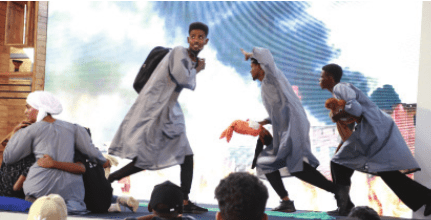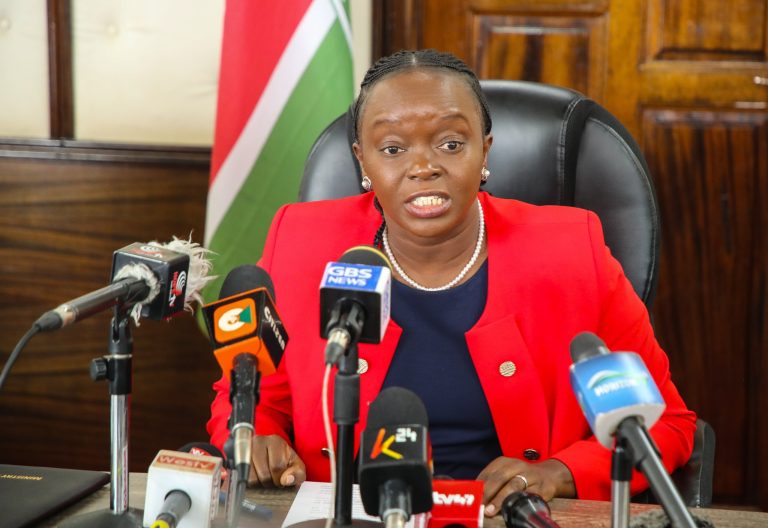Sudan war leaves children displaced, malnourished

With each daybreak, over four million children in Sudan edge closer to malnutrition over the ongoing war, poverty, and displacement which has painted their world in shades of heartbreaking realities.
The entire world has seemingly turned away from its largest displacement crisis and now the silence to this crisis is deafening as millions of other children risk being wiped out by disease outbreaks.
The United Nations (UN) has termed the situation in the war torn country as beyond dire affecting over 24 million children where five million of them have been forced to flee their homes.
Some of the Sudanese children who are now residing in Kenya reminisced about their horrifying encounter at the hands of the gunmen at an event dubbed Unite with the Children of Sudan in Nairobi on Monday
“My country is dying right now,” 15-year-old Wania from Khartoum said.
“After one week of the war, I woke up to the sound of an explosion very close to us. At that moment, I ran to my mom, with tears in my eyes. We were all afraid. We went to a place called Al-Hasaheisa, but the conditions there were difficult.
“The area we lived in was not safe and dangerous, because it was possible that a bomb would fall at any moment. We stayed there for a month, and then we went to Al-Ghadari but there too, we didn’t feel safe.
“From Al-Gadarif, we went to the Ethiopia border so that we could enter Addis Ababa. When we entered, it was the first time I ate and drank since we moved from Al-Gadarif, and then we came to Kenya.”
School closures
Another teenager Minan Malik said their families left Sudan because of war and school closures adding that the war in Sudan has led to the loss of many innocent people.
“We heard gunshots and explosions all over and not far from home. We continue to live in fear of the fight spreading to other cities. Many are struggling till now due to economic hardships. In some places, people are about to die from starvation due to famine. “We feel that responses from international committees are slow and poor. Our people are struggling, our people are dying. We need your help, and we need your voices.
“There is no education, there is not enough supplies. Health services are either poor or do not exist in many parts of the country. From my heart, I hope that one day Sudan will be free and I will be able to go back to my home country.”
Humanitarian agencies operating in Sudan blamed the 14-month-long warfare between the Sudanese Armed Forces (SAF) and Rapid Support Forces (RSF) for their inability to deliver medicine, food and nutrition care to needy children.
Warring parties
They called on the warring parties to cease fire and return to the negotiation table so that peace could prevail.
“The most important thing that needs to happen right now is for the warring parties to silence the guns and return to the negotiating table. First and foremost! Number two is ensuring that the humanitarian organizations that are operating in Sudan can move cross-line, cross-border,” USAID Deputy Assistant Administrator for Africa Bureau Tyler Beckelman said.
He went on: “Many of the children that are on the precipice of famine are in areas that various armed groups control. Humanitarians need to be able to get to them, and we need to be able to support them with the life-saving critical commodities that are needed to prevent malnutrition and stave off what looks like a terrible famine.”
According to the United Nations Children’s Fund (UNICEF), for a year now 19 million children have not been attending school leaving them vulnerable for lack of safety. The agency said that without urgent action, Sudan faces a generational catastrophe with far-reaching implications for the country and the wider region.
Truly shocking
“I see many conflicts in many different places, and indeed there are many problems that children are facing, but I think the immensity of the scale of the problem in Sudan is truly shocking for everyone, and I sometimes feel like it’s almost hard to imagine what children have gone through,” Unicef Executive Director Catherine Russell said.
Russell stated that the children are also facing a protection crisis as many have been separated from their families.
“Essentially, children need different sorts of treatment than adults. They need to be protected, and that’s why we call it a protection crisis. And that’s from everything from killing and maiming to also violence, which is a huge problem for children. And sexual violence, which unfortunately we’re seeing high rates of,” she said.
Unicef boss added: “And this is a grave problem of children being separated from their families. So children are alone and trying to face these challenges by themselves. And so UNICEF works hard to try to identify where children are and to try to offer them the protections that they need as children, as younger people who are not necessarily able to protect themselves.”








